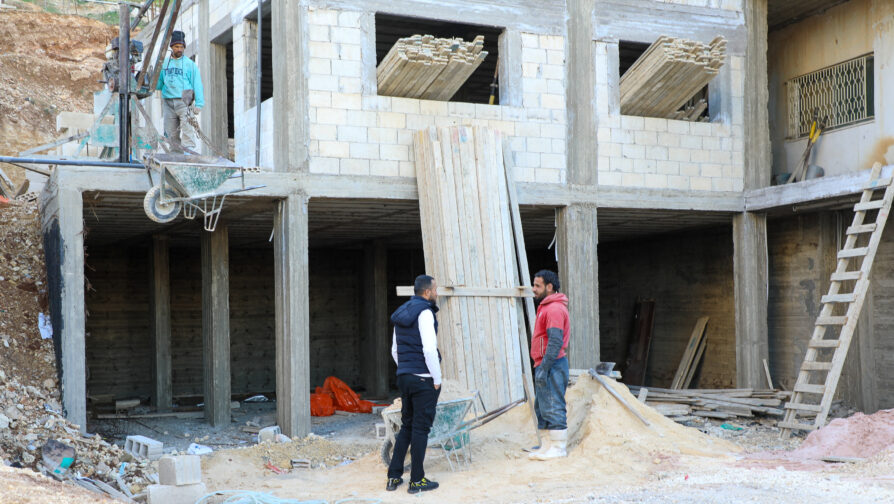COVID-19 emergency cash assistance provides a vital lifeline to refugee families
After Nazir’s work in the construction sector dried up, UNHCR cash assistance helped him provide for his family
Every morning Nazir, 25, leaves his house at 7am to head down to the market in search of work. As a Syrian refugee living in Sweileh, a northern suburb of Amman, he explains that there is a particular area of the market where project managers will come to find construction workers like himself for work on local building sites each day. “I wait at the spot at about 10am, chat with my friends and hope to God there is work.”
Since the COVID-19 pandemic hit, however, work has been hard to come by and Nazir says he now barely works 10 days a month compared to the 20 he was working before. Sadly, this is the reality for many refugee and Jordanian daily workers across the country as the COVID-19 pandemic has led to an increase in unemployment. In Q3 2020, Jordan’s unemployment rate stood at 23 percent.
For refugees who largely relied on daily work, the impact of this has been devastating. Although refugees in Jordan can hold work permits in the agriculture, construction and manufacturing sectors, very few have permanent contracts and instead, like Nazir, make their living being paid by the hour.

Nazir searches for construction work on building sites near his house
“We receive minimum wage as it is but even without this small income it has been extremely difficult. Even if I do find work, it is sometimes only for a couple of hours a day.”
In addition, with no safety net to fall back on UNHCR has also observed an increased in refugees getting into debt. For Nazir this is no surprise.
In September 2020, he says he had to ask his brother in law for money to help him pay his rent after everything he had in reserve had been depleted following six months of the pandemic. Since then, Nazir has managed to persuade his landlord to allow him to forgo paying his rent for the last three months, but as he remains in debt, the worry that he will be evicted continued to plague him. “This situation affects you psychologically. It is difficult to see hope.”
With a young family to take care of – including his newborn two-month-old son Moumen – the pressure was mounting. In December 2020, however, Nazir received an SMS from UNHCR informing him he would receive COVID-19 cash assistance.

Nazir is pictured with his daughter Tabaraka, 4, and his newborn two-month-old son Moumen
“It was a big relief. I was able to get the things my family needs.”
Since the beginning of the COVID-19 pandemic, UNHCR has provided COVID-19 emergency cash assistance to 54,000 families thanks to unearmarked funding from donors such as the United States, Germany and Canada. The assistance is specifically targeted towards families like Nazir’s where there are family members of working age who have been affected by the economic downturn.
Nazir explains that with the cash he ended up buying winter clothes for his children and some proper food; “meat and vegetables. Nutritious food which my wife especially needs as she’s just given birth.”
Despite the assistance, it wasn’t enough to cover his rent and the debt that he currently owes his landlord. Nazir hopes that he will be eligible to receive the emergency cash assistance in subsequent months, so he is able to meet these needs. Some refugee families have received COVID-19 cash assistance from UNHCR up to three times in recognition of the fact that the impact of the pandemic is not going away any time soon. However, UNHCR has not received any funds to continue COVID emergency assistance in 2021.
In addition, UNHCR is supporting Nazir to apply for a work permit which should provide some stability and ensure he has the documentation needed to work in Jordan. In 2020, 38,756 work permits were issued to refugees in Jordan. Despite this, Nazir believes that things won’t start to improve until at least the summer. “In previous year’s there was little work to do in winter as it’s not the time to build because of the rain and cold weather. We always relied on the money made in the summer to get us through. But this year there is none.”

Nazir plays with his daughter Tabaraka at home. He says he has largely stayed at home since the COVID-19 pandemic hit.
For families like Nazir’s creating a semblance of stability is key if they are to continue to be able to rebuild their lives in Jordan. UNHCR cash assistance remains one of the key mechanisms for refugees to do this but in 2021 requires over $100 million of funding to support more than 80,0000 refugee households.
Share on Facebook Share on Twitter
